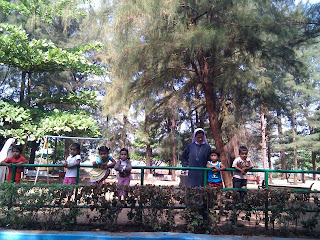Our apartment building has maybe fifty flats. Fully three-quarters of them house Indian families who moved here from America. The most common story goes like this: the husband came to the US in his early twenties for graduate school (business or engineering) and ended up staying between six and twelve years, building his career (and salary history) in the land of dollar-denominated wages. When the young man was established in his career (and, often, also after he had become a US citizen), he sent out a marriage beacon. Because the matchmaking network is the only efficient piece of infrastructure in India, a suitable girl was located within a few months, and on one of the young man's measly two-week American vacations, he came home and got married. The wife accompanied him back to the US (for more on this experience from the wife's point of view, read Jhumpa Lahiri's The Namesake), where their children were born. Please note that this is not a generalization; I can name at least three families who fit this description.
Most of these families come to India on temporary assignments with multinational corporations (MNCs). There are a hundred reasons why they do this, but I'll mention some of the most important: living near extended family; exposing their children to their cultural roots; the opportunity "save like a VP" (ie, to draw an American salary but pay Indian living expenses). The catch with an expat assignment is that it is by definition temporary. If you want to stay here longer than your assignment, the MNC will happily "localize" your salary to the prevailing rate, a cut of at least 50%, and probably more. For most of these families, temporary is fine. One family we know is planning to return to the US when their eldest son reaches high school, because they know he will have a better chance of getting into a top American university that way.
Here's where my friend Somu's story leaves the standard script. Somu came to the US in the mid-eighties to pursue a PhD in computer science at Rutgers. Like many young engineers, he could not resist the call of industry and left Rutgers before finishing his dissertation. Over the next two decades he founded a number of companies, including one that provides software to local elections bureaus. He did return home to get married, and his wife grew to love their suburban American life. He told me that by the time his two daughters were born in the mid-2000s, he could have retired. He had paid off his house, and his companies were so well established that he could basically coast for the rest of his life.
But he didn't want to do that. To mark his twenty-second year in the US, he made a list of 22 reasons to leave America. One was that Americans have forgotten how to eat. Any place where they sell ice cream and shrimp by the bucket has a serious problem. A direct quote: "People don't eat out of buckets--animals eat our of buckets." Yes, but most Americans don't know how animals eat. Every Indian knows what a cow is like--how she eats, moves, relieves herself. Even city dwellers see farm animals on a daily basis. In America we think it is civilized to be separated from the beasts of the field. In fact, the separation makes us less civilized. Certainly with respect to our eating habits.
The real reason Somu moved his family back to India is what you might call duty. The Indians call it "dharma," or the proper way to live. Somu has made it his goal in life never to retire, and he has chosen his hometown, Hyderabad, as the venue for his restlessness. He says he could not imagine wasting his talents, his experience, his expertise, and sitting at home all day. On a much smaller scale, he reminds me of Bill Gates, who must have had a similar realization. Like Gates, Somu decided not to retire, only to change venues. Of course, Somu isn't wealthy enough to take on issues like world poverty or polio or malaria, but he has created at least 25 jobs in his hometown--jobs that did not exist when he left India in 1986, and would not exist if he had not returned 22 years later.
Last week I visited his office to give an English lesson to his staff. We spent an hour working on opposite pairs ("Are you fat?" "No, I am thin." / "Are you hot?" "No, I am cold.") and simple conversation skills.
bounds. The focus is transactional mail--brokerage statements, phone bills, and so forth, which is a huge market opportunity in India, where Internet usage is low and "e-bills" are not an option. I get the feeling it's not the technical challenge that gets Somu out of bed every morning. And it is certainly not the money. Instead, it's the feeling that he is doing right by his countrymen and countrywomen. And also, as he is fond of telling me, "India is just more fun."















